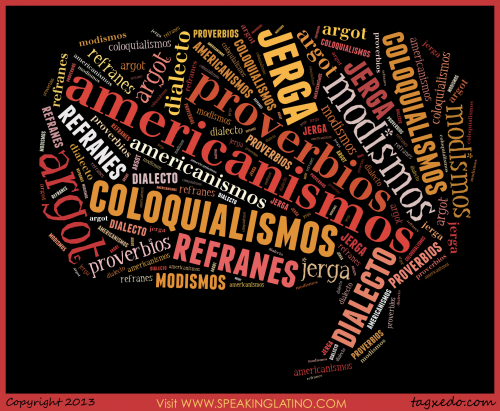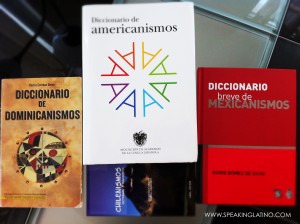 I started collecting and translating Spanish slang in 2003. I had already lived in Mexico, Chile and Argentina as well as traveled to other Spanish-speaking countries. When I arrived in Puerto Rico it amazed me how different the language was from the other countries I knew, even with the country changes I had already experienced. It was so different that I began a list of local words I came across. This list led to publishing my first book Speaking Boricua: A Practical Guide to Puerto Rican Spanish. Then the second Puerto Rican book about idioms and two additional tiles for Argentina and Chile quickly followed.
I started collecting and translating Spanish slang in 2003. I had already lived in Mexico, Chile and Argentina as well as traveled to other Spanish-speaking countries. When I arrived in Puerto Rico it amazed me how different the language was from the other countries I knew, even with the country changes I had already experienced. It was so different that I began a list of local words I came across. This list led to publishing my first book Speaking Boricua: A Practical Guide to Puerto Rican Spanish. Then the second Puerto Rican book about idioms and two additional tiles for Argentina and Chile quickly followed.
But what exactly defines all these “Spanish slang” language differences and variations in the 22 Spanish-speaking countries? If you want a simple explanation, it can be summarized as the Spanish vocabulary unique to a specific country or region. Please note that the previous statement is my personal thought and not an official dictionary definition.
Here are several terms to help describe Spanish slang.
7 Terms to Define Spanish Slang and Their Meanings
1. Argot or jerga (slang or jargon)
According to the Oxford dictionary it is “a type of language that consists of words and phrases that are regarded as very informal, are more common in speech than writing, and are typically restricted to a particular context or group of people.” Another synonym in English is lingo.
Example: “Pasto” is Spanish slang for marijuana
2. Coloquialismo (colloquial language)
It is the informal language used in everyday conversations; it is the words and phrases used in casual conversations that are not used in formal situations like, for example, a speech or business letter.
Example: “Vamos pa’l monte.” is the colloquial expression and pronunciation for “Vamos para la montaña.”
 3. Americanismos (Words from the Americas)
3. Americanismos (Words from the Americas)
Americanismos can be categorized in two ways:
a. Words passed from an indigenous American language to another language.
Example: avocado or aguacate, hurricane or huracán, hammock or hamaca
b. Words or expressions created in the Americas that integrate into the Spanish language
Example: revolú in Puerto Rico and agüite in El Salvador
Notice that in the previous example I identify the country that “created” the word, which is why these words from the Americas may be identified with specific countries, for example dominicanismos, chilenismos, mexicanismos, etc.
The concept of americanismo is not only limited to the vocabulary or lexicon. According to the Diccionario Austral de la Lengua Española it also includes phonetics, grammar, and semantic variations of an American country.
4. Anglicismos and angloamericanismo (Spanish words from English)
English is one of the languages that most influences Spanish today. Spanish words that come from the English are called anglicismos. Angloamericanismos is also a more specific term for the words that come from US English and are adapted into Spanish. According to the previous definitions, an angloamericanismo can be considered both an americanismo because the US is in the Americas and an anglicismo because the words have English origin.
Example: básquebol (basketball), fórmula (baby’s formula), tuit (a tweet) and bloguero (a blogger)
5. Modismo (idiom)
It is a phrase that has a figurative meaning or whose meaning is not clear from the words that form it. People often confuse modismos with proverbs, but they aren’t the same (see proverb explanation below).
Example: “Hay que consultarlo con la almohada” is the equivalent idiom of “Let me sleep on it.”
6. Refrán o proverbio (proverb)
In my opinion, the best way to describe a proverb is a saying passed through generations that contains a lesson or moral. Wikipedia gives us a definition of a proverb: “a simple and concrete saying, popularly known and repeated, that expresses a truth based on common sense or the practical experience of humanity. They are often metaphorical.” An additional trick to differentiate it is that proverbs can’t be conjugated.
Example: “Más vale pájaro en mano, que cien volando” is the Spanish proverb for “A bird in the hand is worth two in the bush”
7. Dialecto (dialect)
A dialect is a regional variation of a language. The term also applies to regional speech patterns, grammar, and vocabulary.
Taking these concepts in mind, how to do think we can categorize Argentine lunfardo and Spanglish?
Check out these other Learning Spanish Slang articles.